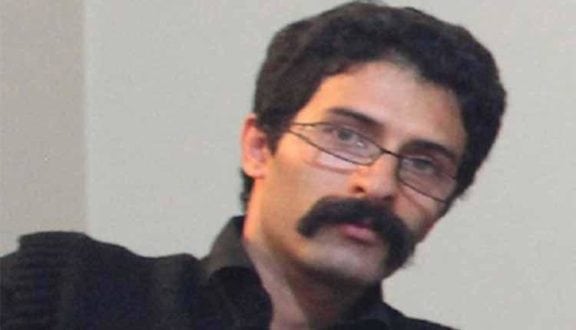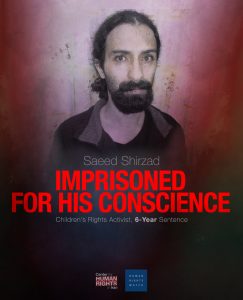CHRI – Behind bars for over five years, prisoner of conscience Saeed Shirzad has been denied an operation to treat his vision problems as well as blocked from attending his mother’s funeral, the Center for Human rights in Iran (CHRI) has been informed.
“Saeed has weak eyes and during the years in prison, his glasses have been broken or scratched several times,” a source close to Shirzad’s family told CHRI on September 23, 2019. “He would have to replace them, but each time it took months to get a new one.”
“Finally he decided to solve the problem by getting an operation,” said the source who spoke on condition of anonymity for security reasons. “His family got an appointment with a doctor and agreed to cover all the expenses. He was supposed to be transferred from prison to an eye clinic on Sunday, September 15, but for some reason that didn’t happen. That was the day before his mother passed away.”
Prisoners in Iran can request to go on furlough (temporary leave) for holidays, medical issues, and life-changing events such as a death in the family, but the authorities didn’t inform Shirzad of his mother’s death and then refused to allow him to attend her funeral.
Furlough is routinely denied to political prisoners as a form of additional punishment.
“The authorities were complacent in informing Mr. Shirzad about his mother’s death, which took place on Monday and he only found out on Wednesday [September 18] during family visitation,” the source told CHRI.
“The family delayed the funeral to allow the paperwork for his furlough to go through so that he could be present at his mother’s burial,” added the source. “But unfortunately the authorities in the prosecutor’s office did not agree to release him even for a few hours.”
Held in Rajaee Shahr Prison in Karaj, west of Tehran, Shirzad has been incarcerated since June 2014 when agents of the Intelligence Ministry arrested him for helping the children of political prisoners in Iran pursue education.
Shirzad was due to be released on April 19, 2019, after completing a five-year prison sentence for the charge of “assembly and collusion against national security” for engaging in peaceful activism. But judicial authorities added the one-year suspended prison sentence that was issued against him in 2012 to his current sentence to punish him for protesting against prison conditions.
On December 8, 2017, Shirzad sewed his lips shut the day he began a hunger strike to demand improved living conditions at the prison, which is known for its harsh treatment of political prisoners.
For about 40 days, he only drank water with a straw through a crack in the stitches until the authorities agreed to consider his request and he was hospitalized.
He has since struggled to access medical treatment for various health issues.
Political prisoners in Iran, including elderly inmates, are singled out for harsh treatment, which often includes denial of medical care. The threat of withheld medical care has also been used as an intimidation tool against prisoners who have challenged the authorities or filed complaints.
“He has severe back pain,” the source close to his family told CHRI. “About a year and a half ago, the doctor recommended 20 physiotherapy sessions but since then he has only been taken to eight sessions, each time after long intervals that make the treatments ineffective.”
In December 2018, another source close this family expressed concern that he Shirzad could lose a kidney if the authorities continued to deny him access to hospital treatment.
It is not known whether Shirzad was allowed to receive the treatment.
Read this article in Persian.
 Shabtabnews In this dark night, I have lost my way – Arise from a corner, oh you the star of guidance.
Shabtabnews In this dark night, I have lost my way – Arise from a corner, oh you the star of guidance.




